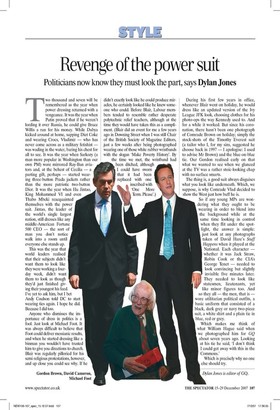Revenge of the power suit
Politicians now know they must look the part, says Dylan Jones Two thousand and seven will be remembered as the year when power dressing returned with a vengeance. It was the year when Putin proved that if he weren't lording it over Russia, he could give Bruce Willis a run for his money. While Dubya kicked around at home, supping Diet Coke and wearing Crocs, Vladimir — who has never come across as a military fetishist — was wading in the water, baring his chest for all to see. It was the year when Sarkozy (a man more popular in Washington than our own PM) wore mirrored Ray-Ban aviators and, at the behest of Cecilia — a parting gift, perhaps — started wearing three-button Prada jackets rather than the more patriotic two-button Dior. It was the year when Hu Jintao, King Mohammed VI and even Thabo Mbeki reacquainted themselves with the power suit. Jintao, the leader of the world's single largest nation, still dresses like any middle-American Fortune 500 CEO — the sort of man you don't notice walk into a room until everyone else stands up. This was the year that world leaders realised that their subjects didn't want them to look like they were working a fourday week, didn't want them to look as though they'd just finished giving their youngest his feed. I've yet to ask him, but I bet Andy Coulson told DC to start wearing ties again. I hope he did. Because I did too.
Anyone who dismisses the importance of dress in politics is a fool. Just look at Michael Foot. It was always difficult to believe that Foot could deliver messianic results, and when he started dressing like a binman you wouldn't have trusted him to give you directions to church. Blair was regularly pilloried for his semi-religious protestations, however, and up close you could see why. If he didn't exactly look like he could produce miracles, he certainly looked like he knew someone who could. Before Blair, Labour members tended to resemble rather desperate polytechnic relief teachers, although at the time they would have taken this as a compliment. (Blair did an event for me a few years ago in Downing Street when I was still Chair of the British Society of Magazine Editors, just a few weeks after being photographed wearing one of those white rubber wristbands with the slogan 'Make Poverty History'. By the time we met, the wristband had been ditched, although I could have sworn that it had been replaced with one inscribed with 'One More Term. Please'.) During his first few years in office, whenever Blair went on holiday, he would dress like an updated version of the Ivy League JFK look, choosing clothes for his photo-ops the way Kennedy used to. And for a while it worked. But since his coronation, there hasn't been one photograph of Comrade Brown on holiday; simply the stock-shots of the Timothy Everest suit (a tailor who I, for my sins, suggested he choose back in 1997 — I apologise: I used to advise Mr Brown) and the blue-on-blue tie. Our Gordon realised early on that what we wanted to see when we glanced at the TV was a rather stoic-looking chap with no surface smarts.
The thing is, a good suit always disguises what you look like underneath. Which, we suppose, is why Comrade Vlad decided to show the West just how buff he is.
So if any young MPs are wondering what they ought to be wearing in order to blend into the background while at the same time looking in control when they flit under the spotlight, the answer is simple: just look at any photographs taken of David Hare's Stuff Happens when it played at the National. Each character — whether it was Jack Straw, Robin Cook or the CIAs George Tenet — needed to look convincing but slightly invisible five minutes later. They needed to look like statesmen, lieutenants, yet like minor figures too. And so they all — the men, that is — wore utilitarian political outfits, a basic uniform that consisted of a black, dark grey or navy two-piece suit, a white shirt and a plain tie in blue, red or grey.
Which makes me think of what William Hague said when we photographed him for GQ about seven years ago. Looking at his tie he said, 'I don't think I could get away with this in the Commons.'
Which is precisely why no one else should try.

































































































 Previous page
Previous page